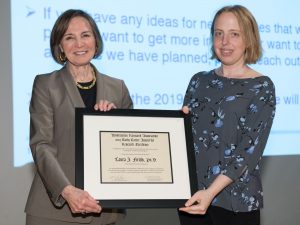
URA Executive Director Marta Cehelsky, left, presents Laura Fields with her award. Photo: Reidar Hahn
For her significant and varied impact on accelerator-based neutrino physics, Laura Fields has been given the URA Early Career Award. This new award recognizes outstanding work conducted by an early-career researcher at Fermilab or for work benefiting the Fermilab scientific program. It includes $5,000 from the Universities Research Association.
“We are thrilled to have the opportunity to highlight and recognize the incredible work done by Laura Fields, whose breadth and depth of impact is just remarkable,” said award committee co-chair Sarah Demers of Yale University.
As co-spokesperson for the MINERvA neutrino experiment, Fields was recognized for her “outstanding leadership of the MINERvA collaboration.”
“Our goal is to provide data that will tune neutrino interaction models that will be used by many neutrino experiments,” said Fields, noting the key role MINERvA plays in the success of neutrino oscillation experiments.
MINERvA supports Fermilab’s mission to unlock the secrets of CP violation in the neutrino sector, which has the potential to answer the question of why our universe is predominantly made of matter instead of antimatter. The experiment has 26 publications to date, and most were produced with Fields leading the analysis or the collaboration. Her work to prioritize and guide analysis efforts made possible MINERvA’s large physics output, in spite of MINERvA being a small collaboration.
Fields’s award-winning work also covers her efforts for the international Deep Underground Neutrino Experiment (DUNE), hosted by Fermilab. Fields helped design a system for the Long-Baseline Neutrino Facility, or LBNF, the facility for DUNE, that would increase the number of neutrinos DUNE scientists could study. In collaboration with LBNF and Fermilab engineers, Fields’s efforts to optimize this system yielded a 36% increase in the number of neutrinos with energies between 1 and 4 billion electronvolts, a key energy range for studying neutrino oscillations.
“URA is very pleased to inaugurate a new award this year honoring great work by promising early career scientists,” said URA Executive Director Marta Cehelsky. “The work of Laura Fields in leading the MINERvA collaboration recognizes her leadership and achievements and frames the high standard of this award.”
Prior to joining MINERvA and making the jump to neutrino physics during her postdoctoral work at Northwestern University, Fields earned her Ph.D. at Cornell University studying charm interactions on the CLEO-c experiment.
“It is not unusual for someone to switch from charm physics to neutrinos,” said award committee co-chair and Fermilab scientist Juliana Whitmore. “What is unusual is to have someone do that and become a leader in the new field in such a short time. That makes her achievements even more remarkable.”
Fields herself was honored by the award and is pleased that this type of work is being noticed.
“This is an indication that the high-energy physics community is recognizing the many challenges that go into our neutrino measurements and the importance of addressing each of them,” she said.



